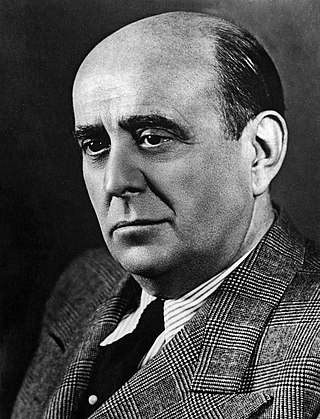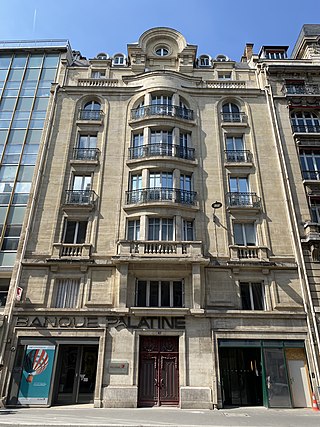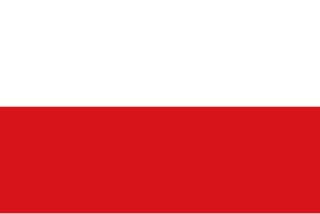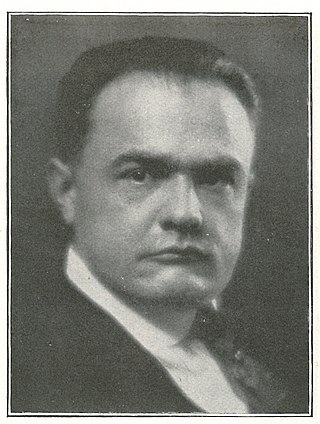
Tomáš Garrigue Masaryk was a Czechoslovak statesman, progressive political activist and philosopher who served as the first president of Czechoslovakia from 1918 to 1935. He is regarded as the founding father of Czechoslovakia.

Jan Garrigue Masaryk was a Czech diplomat and politician who served as the Foreign Minister of Czechoslovakia from 1940 to 1948. American journalist John Gunther described Masaryk as "a brave, honest, turbulent, and impulsive man".

Milan Rastislav Štefánik was a Slovak politician, diplomat, aviator and astronomer. During World War I, he served at the same time as a general in the French Army and as Minister of War for Czechoslovakia. As one of the leading members of the Czechoslovak National Council, he contributed decisively to the cause of Czechoslovak sovereignty, since the status of Czech- and Slovak-populated territories was one of those in question until shortly before the disintegration of the Austro-Hungarian Empire, in 1918.

The Czechoslovak Legion were volunteer armed forces consisting predominantly of Czechs and Slovaks fighting on the side of the Entente powers during World War I and the White Army during the Russian Civil War until November 1919. Their goal was to win the support of the Allied Powers for the independence of Lands of the Bohemian Crown from the Austrian Empire and of Slovak territories from the Kingdom of Hungary, which were then part of the Austro-Hungarian Empire. With the help of émigré intellectuals and politicians such as the Czech Tomáš Garrigue Masaryk and the Slovak Milan Rastislav Štefánik, they grew into a force over 100,000 strong.

Roland Sletor Morris was an American lawyer and diplomat. He was one of the founders of the Philadelphia-based law firm Duane Morris in 1904 and served as the United States Ambassador to Japan from 1917 to 1920.

Stephen Jean-Marie Pichon was a French journalist, diplomat and politician of the Third Republic. The Avenue Stéphen-Pichon in Paris is named after him.

Sergei Dmitryevich Sazonov GCB was a Russian statesman and diplomat who served as Foreign Minister from November 1910 to July 1916. The degree of his involvement in the events leading up to the outbreak of World War I is a matter of keen debate, with some historians putting the blame for an early and provocative mobilization squarely on Sazonov's shoulders, and others maintaining that his chief preoccupation was "to reduce the temperature of international relations, especially in the Balkans".

The Banque Industrielle de Chine was a French bank with its main activities in China and French Indochina. It was created in 1913, expanded rapidly, but closed in 1921 because of the political context in China, causing a political controversy in France. Its activity was continued by the Franco-Chinese Bank, in China until the 1950s and in Indochina until the 1970s.

The Battle of Zborov was a part of the Kerensky Offensive. The battle was the first significant action of the Czechoslovak Legions on the Eastern Front.

The First Czechoslovak Republic, often colloquially referred to as the First Republic, was the first Czechoslovak state that existed from 1918 to 1938, a union of ethnic Czechs and Slovaks. The country was commonly called Czechoslovakia, a compound of Czech and Slovak; which gradually became the most widely used name for its successor states. It was composed of former territories of Austria-Hungary, inheriting different systems of administration from the formerly Austrian and Hungarian territories.

Karel Pergler, known also by Anglicized Charles Pergler was a Czech-American lawyer, journalist, diplomat and politician. He was a Czechoslovak First Republic ambassador to the United States and Japan.

Under Fire: The Story of a Squad by Henri Barbusse, was one of the first novels about World War I to be published. Although it is fiction, the novel was based on Barbusse's experiences as a French soldier on the Western Front. It was awarded the Prix Goncourt in 1916. The novel is described as one of the earliest works of the Lost Generation movement or as the work which started it; the novel had a major impact on the later writers of the movement, namely on Ernest Hemingway and Erich Maria Remarque.

Štefan Osuský was an Austro-Hungarian born Slovak lawyer, diplomat, politician and university professor.

Edvard Beneš was a Czech politician and statesman who served as the president of Czechoslovakia from 1935 to 1938, and again from 1939 to 1948. During the first six years of his second stint, he led the Czechoslovak government-in-exile during World War II.

Charlotte Garrigue Masaryk was the American-born wife of the Czechoslovak philosopher, sociologist, and politician, Tomáš Garrigue Masaryk, the first President of Czechoslovakia.

The Czechoslovak Declaration of Independence or the Washington Declaration was drafted in Washington, D.C., and published by Czechoslovakia's Paris-based Provisional Government on 18 October 1918. The creation of the document, officially the Declaration of Independence of the Czechoslovak Nation by its Provisional Government, was prompted by the imminent collapse of the Austro-Hungarian Empire, of which the Czech and Slovak lands had been part for almost 400 years, following World War I.

Stanislav Čeček was a Czechoslovak general.

Enrollment of Czechoslovak volunteers in the French Foreign Legion started in Paris on 21 August 1914. The 1st Company, Battalion C, of the 2nd Infantry Regiment of the Foreign Legion, was created in Bayonne on 31 August. Meeting in the city, the soldiers greeted each other with "Na zdar!" and hence came to be called "Nazdar!" Company. The company was part of the French army's Moroccan division, and took part in heavy combat during assaults near Arras on 9 May and 16 June 1915, where it suffered heavy casualties. Because of these, Battalion C, including "Nazdar!" Company, was disbanded, and volunteers continued to fight in various French army and Foreign Legion units.

The Czechoslovak Italian Legion was a legion of Czechoslovak volunteers formed late in World War I. The first formal Czechoslovak Volunteers Group was formed in Italian prisoner-of-war camps in Santa Maria Capua Vetere, near Naples and matured at Padula near Salerno. In January 1918, the headquarters of the 6th Italian Army finally agreed to form reconnaissance squadrons from Czechoslovak and Southern Slav volunteers. In September 1918, the 39th Regiment of the Czechoslovak Italian Legion was formed from those volunteer reconnaissance squadrons. The following regiments of Czechoslovak Italian Legion were formed in April and May 1918:

Czechoslovak National Council was an organization founded by Czech and Slovak émigrés during World War I to liberate their homeland from Austria-Hungary. During the closing weeks of the war, the Czechoslovak National Council was formally upgraded to a provisional government and its members were designated to hold top offices in the First Czechoslovak Republic.




















